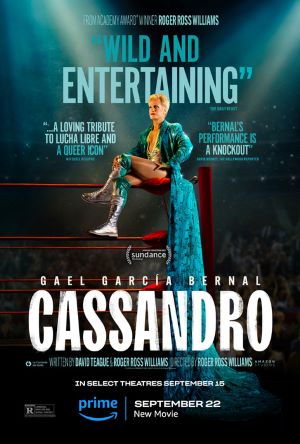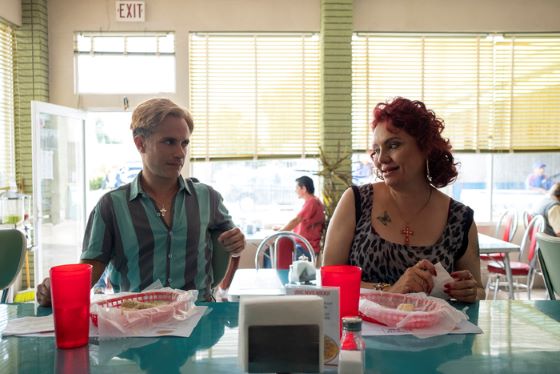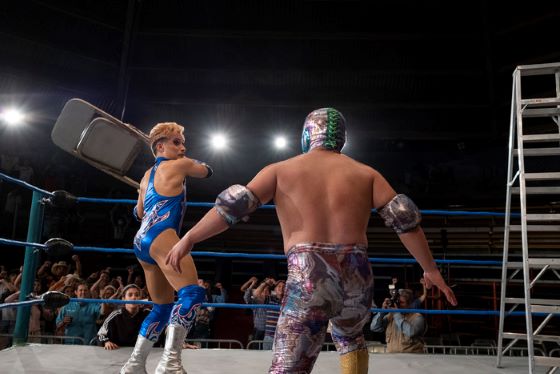

[Rating: Minor Rock Fist Up]
Streaming on Prime September 22
An unconventional story that struggles at times to overcome the conventions of its genre, Cassandro is the film equivalent of a dynamite tag team partner in search of their finisher. At its best when focusing on the personal growth and professional development of its lead, and at its shakiest when it ventures too far outside of the wrestling ring where much of that is confined, the movie is a fun, escapist fairy tale that benefits from its “true story” bona fides.
Saúl (Gael García Bernal) lives with his mother (Perla De La Rosa) in an El Paso house so close to the Mexican border that they can see the wall diving the two countries out their kitchen window. Indeed, as the opening moments of Cassandro reveal, this notion of “two worlds” is foundational to the larger text. Not only does Saúl cross over into Mexico to perform in amateur Lucha Libre matches (itself a representation of character duality), but as an out gay man in the late-1980s, he must choose how much of himself it is safe to share with the world. Although Saúl has a loving relationship with his mom, she also reminds him early on that it was his homosexuality that drove his father away, leaving them further segmented into an entirely different world apart from wresting masks and sexual preference: one of poverty.
Encouragement from an established wrestler and Luchador trainer, Sabrina (Roberta Colindrez), inspires Saúl to change up his in-ring role from “runt” to “exótico,” which allows him the freedom to explore the more flamboyant and dramatic side of his stage persona. What’s more, Saúl challenges the conventions of the classic Lucha Libre script by insisting that his new exótico character, “Cassandro,” be allowed to win matches rather than just appear in them as a glorified clown. Saúl’s rise is meteoric, thanks in large part to a shady promoter, Lorenzo (Joaquín Cosío), that takes an interest in his success, yet as is often the case in rags-to-riches sports biopics, the path to the mountain top’s summit only gets steeper as Saúl ascends.

Director Roger Ross Williams co-wrote the script for Cassandro with David Teague, and their respect and admiration for the real-life Saúl Armendáriz is present in every aspect of the picture. The story is a fully rounded one that is not just a celebration of Saúl’s journey to discover the best version of himself while in the ring, but outside of it in his personal life as well. His romance with a closeted Luchador, Gerardo (Raúl Castillo), and the complicated dynamic with Saúl’s mother provide efficient context and history that accomplishes in minutes what so many overwrought television shows stretch into a tedious season’s worth of storyline.
These narrative shortcuts move the story along at a clip that allows for a very crisp 107-minute runtime yet do shortchange the story at times: particularly the arc involving Saúl’s mother. Bernal is also so electric in the lead role that he tends to blow his scene partners off the screen, with Castillo the most frequent victim of this imbalance. Indeed, with the exception of Colindrez, nobody is really playing up to Bernal’s level, which is award season caliber and enough to elevate this by-the-numbers sports yarn into something special.

The wresting itself is well-choreographed and exciting and serves as a decent (though not at all comprehensive) introduction to the world of Lucha Libre. The audience is allowed to connect the thematic dots that bind Saúl’s personal journey to the ways in which the exótico ring character serves as a transgressive inversion of Mexico’s macho culture. This keeps the whole affair under two hours, and while the film is better for that in the long run, it might alienate some viewers who aren’t as familiar with Mexico’s history and Catholic traditions.
Crammed full of heart, genuine emotions, and the thrill of an underdog fighting to the top of the heap, Cassandro is Rocky with glam and no gloves. Bernal deftly balances the flair and charisma of a performer with a live audience in the palm of his hand inside the ring with the unassuming and tentative aspects of Saúl’s life outside of it. His performance is nothing short of revelatory: so much so that those around him often can’t keep up, let alone match. The story is a fascinating one, and delivered with confident, knowing hands that don’t just cherish the events and man behind them, but want to share them with the world. Like the exótico wrestlers themselves: it might not be what the audience is expecting, but it is more than capable of surprising and even getting the win.





Comments on this entry are closed.